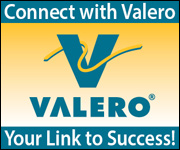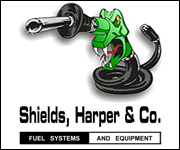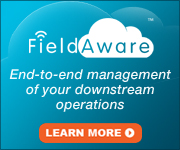|
I started my education into modern lighting in 2008 when our existing legacy metal halide canopy lighting was dictated to be upgraded by new requirements resulting from reimaging. The incremental improvement was to move to more efficient metal halide high intensity discharge (HID) lighting. However, LED canopy lighting had just become available from LSI and Beta. I embarked on reviewing both options and ultimately decided on LSI’s option. With the industry evolving at a rapid speed, product generations are only lasting a year, or sometimes less. Not to mention the fact that prices are dropping so quick that with our second purchase from LSI two years later, we realized it was significantly less for an improved product.
The industry started with focusing on canopy and perimeter lighting, but has moved into beverage cooler and most recently, interior lighting. Interior lighting has a lot more players than exterior, but it’s very critical that you do your research.
Here are some terminologies that are good to know when shopping for all lighting, not just LED:
Now that you are a lighting expert, I must mention that fluorescent lighting still has a place in the lighting world. It is often about half to a third the price of premium LED options, and with modern T5 bulbs, you can get near LED life. I suggest that for hard/challenging areas to reach for maintenance, LED is a great option. That extra cost up front will pay off in the long run. That is why LED was first rolled out to canopy and perimeter lighting, in addition to the vast energy savings.
I can go on for pages and pages about lighting, so if you want additional information, I am happy to speak with CIOMA members, POC attendees and any interested parties about this topic. With every situation being unique, there is not always one best solution. I’m sure by the time this article is released, there will be yet another LED innovation being launched...
Article Provided By: Chris Bambury CIOMA & POC Board Member |
|
CIOMA's Upcoming Calendar of Events
|
|
Join us for CIOMA's annual Day at the Capitol where members experience a unique opportunity to have their voices heard at the California State Capitol. Spend the day with us as we walk the halls of the Capitol and meet with policy makers to educate them on key issues that affect your business, your industry, as well as share CIOMA's collective message.
This year, we have a wonderful and exciting new program in store for you. We are in the process of securing a special hearing room at our State Capitol where members can gather and receive an overview from speakers of the legislative process/current environment. Upon conclusion of our presentation, CIOMA members will go over some Lobby Day Issues & Basics which will take place in the form of a first-ever "Mock Visit and Follow-up Discussion". We request your advance registration so we can be sure to schedule an appointment with your legislative representatives.
It is important to know that as members, your grassroots activity dovetails with CIOMA's legislative program and the work done on behalf of CIOMA by our legislative advocate (lobbyist). All of these elements are necessary and are key to making an effective team to promote your perspectives on issues and protect your interests. Please stayed tuned as we fine-tune the details for this event and be on the look-out for emails advising that registration is open for Day at the Capitol.
|
|
The CIOMPAC 16th Annual Destruction Derby is back for it's 16th year. If you've attended in the past, you know the sites, the sounds, and the smells. If you've never joined us you're really missing out! The main event is open to the public for a nominal fee. We offer in-your-face car-on-car destruction, good food, fireworks, and an event you won't forget. Our members may enjoy showing up a day or two earlier for family fun, networking, free food, and an all-around good time. We have plenty of room for your RV and this event won't cost you anything (unless you want to purchase a pre-built car to smash or you'd rather not get your hands dirty and just want to take a little spin in the booze cruise). Please stayed tuned as we fine-tune the details for this event and be on the look-out for emails and postcards advising that registration is open for Derby. |
|
The Washington state Department of Ecology yesterday issued a discussion draft for a low-carbon fuel standard (LCFS) that would require a 10pc cut in the carbon intensity of the state's fuels by 2026.
The draft proposal, closely modeled on California's LCFS, would require cuts starting in 2017 with relatively modest targets before ramping up substantially from 2021-2026. The department is taking comments on the draft plan until 4 March.
Washington's LCFS would use a modified version of the lifecycle greenhouse gas model that California uses, which is due for changes over the next few months. The program would also adopt the many default fuel pathways that California has issued under its LCFS. The pathways set the carbon intensity scores for various fuels used in the state.
The program would also adopt California's current indirect land-use change scores for crop-based biofuels, but not the revised values that California is close to finalizing. The new values are generally much lower because of updates to the science and models that the California Air Resources Board (ARB) has used over the past two years.
The draft also picks up provisions from the amendments ARB is considering this year, including a credit clearance market. Under that proposal, Washington would allow covered entities to roll over unfilled compliance obligations from one year to the next if they can show that there are insufficient credits available in the market.
Compliance with the LCFS is measured in credits and deficits. Fuels that beat each year's carbon-intensity target generate credits, while those that exceed it produce deficits. The Department of Ecology has not proposed a price cap for its credit clearance mechanism, but California's is being set at $200/t.
Oregon, which recently finalized its LCFS regulations, may pursue the mechanism for its program if the legislature amends the authorizing legislation. Washington governor Jay Inslee (D) has not made a final decision on whether the state will adopt the LCFS through its existing legal authorities or if he will seek new legislation. Inslee has said the draft review process and reaction from state legislative leaders would guide his decision.
News Release provided by: Cortney Becker Argus Media |
|
It is that time of year again, California. As the days grow shorter and the nights grow semi-colder (it is still California after all), a flurry of activity begins as employers revisit their policies and handbooks to assess compliance with the bevy of new California employment laws that take effect on January 1, 2015, or thereafter. This year, there is something for everyone: a law that imposes paid sick leave on nearly every business with California operations, an expansion of anti-harassment training requirements, and even a few new wage laws thrown in for good measure. Because these laws have created or expanded employee rights and benefits, employers should consider whether their current handbooks and policies properly address the new requirements. All new laws discussed below are effective on January 1, 2015, unless otherwise indicated.
I. Time Off
A. Mandatory Paid Sick Leave
AB 1522, the "Healthy Workplaces, Healthy Families Act of 2014" ("Act"), is a landmark piece of legislation that requires employers to provide paid sick leave to any employee who works in California for at least 30 days within the first year of employment. The law, which is effective on July 1, 2015, requires the accrual of paid sick time at a rate of one hour of sick time for every 30 hours worked. Employers are allowed to limit an employee’s use of paid sick leave to 24 hours (or three days) during each year of employment. Employers must allow sick leave to carry over into the following year of employment unless they provide employees with sick time each year in a lump-sum at the beginning of the year. If sick days are not accrued in a lump-sum, employers must allow employees to accrue up to 48 hours (or six days). While we believe that the Legislature’s intention was to allow employers to impose both a three-day limitation on annual use and a six-day cap on accrual where sick days are accrued over time, the statutory language is not perfectly clear. Therefore, the easiest way to comply with the new law (and ensure a three-day limit on the use of sick days is permissible) will be to frontload 24 hours (or three days) of sick time at the beginning of each calendar year.
Accrued, unused sick leave need not be paid out upon termination of employment. Employers may also establish a 90-day waiting period after hire before accrued paid sick leave may be used and may require sick leave to be used in minimum increments of two hours or less. Employers that wish to impose such limitations are advised to set forth the restrictions in a written sick leave policy.
Employers with vacation/paid time off ("PTO") policies that provide employees with at least the same rights set forth in the Act are not required to offer employees additional paid sick time benefits so long as at least 24 hours (or three days) of the vacation/PTO time may be used for any qualifying purpose under the Act. The qualifying purposes for leave include:
Thus, a PTO policy or vacation policy that provides at least three days of vacation per year may be sufficient as to any employees covered by the policy if it permits time off to be taken in two-hour increments (or less) for any purpose. Employers that presently provide sick leave will need to assess whether their current policy comprehensively covers the permitted uses under the new law. For example, many sick leave policies limit half of the allotment to kin care. However, the Act requires that any sick leave provided under the Act be available for use for family members and covers members of the family, such as grandparents, siblings, and those to whom the employee stands in loco parentis, who may not be covered by an employer’s existing sick leave policy.
There is no minimum number of employees that an employer must employ to trigger application of the law and no requirement that the employee live in California or spend a majority of his or her work time in California. Indeed, an employee may work for six weeks in California at varying points throughout the year and work in Maryland the rest of the time, but he or she will still be covered under the Act. Likewise, part-time and even temporary or seasonal employees may accrue time under the Act. But, of course, if such employees do not remain employed for at least 90 days following the outset of employment, they may never become eligible to actually take sick time. There are very few employees excepted from the law, but such exceptions include in-home health care workers, flight deck and cabin crew members covered by the Railway Labor Act, and some workers covered by a collective bargaining agreement.
The Act contains detailed record-keeping and notice requirements, including a new poster requirement, notice of rights to new employees, and a requirement that available sick leave be documented in employee wage statements. Specifically, the law requires employers to state in a wage statement (pay stub) the number of hours of sick time an employee has left in the applicable year. The law also contains penalties for noncompliance as well as significant protections against retaliation.
B. Time Off for Emergency Duty
AB 2536 makes two significant changes to existing law that prohibits an employer from discharging or in any manner discriminating against an employee who takes time off to perform emergency duty as a volunteer firefighter, reserve peace officer, or emergency rescue personnel. First, the legislation expands the definition of "emergency rescue personnel" to include an officer, employee, or member of a disaster medical response team sponsored or requested by the state. Second, the legislation requires an employee who is a health care provider to notify his or her employer (i) at the time that he or she becomes designated as emergency rescue personnel and (ii) when the employee is notified that he or she will be deployed for emergency duty.
II. Discrimination, Harassment, and Retaliation Protections
A. Protections for Unpaid Interns and Volunteers
On September 9, 2014, California Governor Jerry Brown signed into law AB 1443. This law amended California’s Fair Employment and Housing Act ("FEHA") to add unpaid interns (and persons under limited-duration programs that provide unpaid work experience) to the list of persons protected by California’s anti-discrimination and anti-harassment laws. Specifically, AB 1443 prohibits discrimination against any person in the "selection, termination, training, or other terms or treatment of that person in an unpaid internship, or another limited duration program to provide unpaid work experience for that person." The legislation also extends religious belief protections and religious accommodation requirements to anyone in an apprenticeship training program, an unpaid internship, or any other program to provide unpaid experience in the workplace or industry.
B. Harassment Training: Prevention of Abusive Conduct
AB 2053 requires employers subject to the mandatory sexual harassment prevention training requirement for supervisors to now include a component in such training on the prevention of abusive conduct. "Abusive conduct" is defined as "conduct of an employer or employee in the workplace, with malice, that a reasonable person would find hostile, offensive, and unrelated to an employer’s legitimate business interests." According to the statute, "abusive conduct" may include the repeated infliction of verbal abuse (e.g., derogatory remarks, insults, and epithets); verbal or physical conduct that a reasonable person would find threatening, intimidating, or humiliating; or the gratuitous sabotage or undermining of a person’s work performance. A single act will not typically constitute abusive conduct unless it is especially severe and egregious.
The law does not create a cause of action for abusive conduct in the workplace, but it does appear to be the first step toward protecting workers against bullying in the workplace that is not linked to any form of illegal discrimination.
C. National Origin Discrimination: Driver’s Licenses for Undocumented Persons
Beginning January 1, 2015, the California Department of Motor Vehicles is scheduled to start issuing driver’s licenses to undocumented persons who can submit satisfactory proof of identity and California residency. AB 1660 makes it a violation of FEHA for an employer to discriminate against an individual because he or she holds or presents such a driver’s license and amends FEHA to specify that "national origin" discrimination includes discrimination on the basis of possessing such a driver’s license.
The legislation also makes it a violation of FEHA for an employer to require a person to present a driver’s license, unless possessing a driver’s license is required by law or is required by the employer, and the employer’s requirement is otherwise permitted by law. For example, a retail clerk may not need a driver’s license in the scope of his or her duties. Therefore, while the employer’s application for employment may ask for the applicant’s driver’s license information, it may not condition the job upon the applicant providing this information.
AB 1660 provides that actions taken by an employer that are required to comply with federal I-9 verification requirements under the Immigration and Nationality Act ("INA") do not violate California law. Thus, AB 1660 does not affect an employer’s rights or obligations under the federal INA if presented with such a driver’s license.
Finally, the new legislation requires employers to treat employee driver’s license information as confidential and prohibits disclosure to any unauthorized person or use for any purpose other than to establish identity and authorization to drive.
D. Unfair Immigration-Related Practices
AB 2751 makes "cleanup" changes to prior law protecting employees from "unfair immigration-related practices." AB 2751 expands the definition of an "unfair immigration-related practice" to include threatening to file or filing a false report or complaint with any state or federal agency.
The new legislation also revises California Labor Code section 1024.6, which prohibits employers from "discharging or in any manner discriminating, retaliating, or taking any adverse action against an employee because the employee updates or attempts to update personal information," defined as information relating to "a lawful change of name, [S]ocial [S]ecurity number, or federal employment authorization document."
The updated Labor Code section also removes a provision that allowed an employer to take adverse action if the employee’s personal information changes are directly related to the skill set, qualifications, or knowledge required for the job. Given these changes, as well as a recent Executive Order permitting employment authorization to undocumented workers who have no criminal background, it is much more likely that employees who assumed identities or presented false documents will come forward. This may test an employer’s honesty policy and lead to possible discrimination claims under California law. Employers are cautioned against taking adverse action against an employee who provides a new Social Security number for falsifying a job application or other employment document, even if the employer suspects that the change is due to a previously unlawful employment status.
The new legislation also clarifies existing law regarding potential penalties for retaliating against an employee who reports unfair immigration-related practices under Labor Code section 98.6. Specifically, the cleanup legislation makes clear that, if a civil penalty is awarded under Labor Code section 98.6, the award is payable to the employee.
E. Non-Discrimination Against Public Assistance Recipients
AB 1792 prohibits employers with more than 100 employees who are beneficiaries of the Medi-Cal program from (i) discharging, discriminating, or retaliating in any manner against an employee who enrolls in a public assistance program; (ii) refusing to hire a beneficiary for reason of being enrolled in a public assistance program; or (iii) disclosing that an employee receives or is applying for public assistance, unless otherwise permitted by state or federal law.
F. Harassment Training: Farm Labor Contractors
SB 1087 requires a farm labor contractor to certify to the Labor Commissioner that its employees received required sexual harassment training in order to receive a farm labor contractor’s license. Unlike the training requirements of AB 1825, supervisory employees of farm labor contractors must be trained for at least two hours each calendar year, and nonsupervisory employees also must be trained (i) at the time of hire, and (ii) once every two years thereafter.
The law also (i) restricts the State of California from granting a license to a farm labor contractor who has engaged in sexual harassment; (ii) changes the mandatory written examination process; and (iii) increases licensing fees, bonding requirements, and penalties.
III. Wage and Hour
A. Client Liability for Labor Contracts
AB 1897 imposes liability for wage and hour violations of staffing agencies or subcontractors on employers that contract for labor. Under the new law, if a labor contractor fails to pay its workers properly or fails to provide workers’ compensation coverage for those employees, the "client employer" can be held legally responsible and liable. A worker or the worker’s representative must notify the client employer of specified violations at least 30 days prior to filing a civil action against a client employer to provide an opportunity to cure the violation.
The legislation also expands to client-employers' liability resulting from the staffing agency or subcontractor entering into a contract for labor or services with a construction, farm labor, garment, janitorial, security guard, or warehouse contractor, if the staffing agency or subcontractor knows or should know that the contract or agreement does not include sufficient funds for it to comply with laws or regulations governing the labor or services to be provided.
AB 1897 also prohibits an employer from retaliating against a worker for notifying it of a wage violation or for filing a claim or civil action.
B. Clarification of Rest and Recovery Periods
Last year, Labor Code section 226.7 was amended to provide rest and recovery periods for employees to recover from heat illness. SB 1360, which was made effective upon passing in June 2014, confirms that rest and recovery periods are paid breaks and count as hours worked. SB 1360 does not create new law but merely clarifies the existing requirements.
C. Waiting-Time Penalties
AB 1723 authorizes the Labor Commissioner, in issuing citations for failure to pay the minimum wage, to award any applicable penalties for an employer’s willful failure to timely pay wages to a resigned or discharged employee, also called "waiting time" penalties.
Another new law, AB 2743, provides a waiting-time penalty if unionized theatrical and concert venue employees violate any agreed-upon timeframe for payment of final wages contained in a collective bargaining agreement.
D. Labor Code Complaints
AB 2751 amends Labor Code section 98.6 to clarify that the $10,000 penalty for retaliation against an employee who complains of Labor Code violations will be awarded to the employee or employees who "suffered the violation." This law does not create a new penalty but merely clarifies existing law.
E. Timeframe for Recovery of Liquidated Damages
Existing law permits an employee to recover liquidated damages from the employer for failure to pay the minimum wage, in the amount of the unpaid wages plus interest. AB 2074 clarifies that the statute of limitations for a lawsuit to pursue liquidated damages for failure to pay the minimum wage will not run until the expiration of the statute of limitations for the wages for which the penalties are sought, which is three years. Some recent court cases had held that liquidated damages claims had to be filed within one year, the statute of limitations for penalties. AB 2074 effectively overrules those holdings by statute.
F. Foreign Labor Contractors
SB 477 affects employers that use foreign labor contractors to recruit foreign workers for projects in California. The new law changes the definition of "foreign labor contractor" to mean a person who performs "labor contracting activity," including "recruiting or soliciting for compensation a foreign worker who resides outside of the United States in furtherance of that worker’s employment in California."
The new law protects foreign workers in a variety of ways. First, the new law prohibits a foreign labor contractor from charging a fee or cost to a foreign worker for foreign labor contracting activities. Second, the new law prohibits charging a foreign worker with any costs or expenses not customarily assessed against similarly situated workers, and limits the amount of housing costs charged to the foreign worker to the market rate for similar housing. Third, the new law prohibits requiring a foreign worker to pay any costs or expenses prior to commencement of work or changing the terms of the contract originally provided to and signed by the foreign worker (unless the foreign worker is given at least 48 hours to review and consider the additional requirements or changes and specifically consents to each additional requirement or change).
In addition, the new law requires foreign labor contractors to meet registration, licensing, and bonding requirements by July 1, 2016, and prohibits employers from using non-registered foreign labor contractors to supply workers in California.
The new law also provides for civil action and penalties for noncompliance and joint liability for employers that use non-registered foreign labor contractors.
G. Prevailing Wages
Several of bills passed this year impact employers that provide services for public works projects requiring payment of the prevailing wage. Among them are AB 26, which redefines the word "construction" in public works projects to also include work performed during the post-construction phases of construction, including all cleanup work at the jobsite, and AB 2744, which allows enforcement mechanisms that can be used against contractors or subcontractors on public works projects to now be used for violations relating to the employment of apprentices on these projects. New legislation also allows a contractor to bring an action against "hiring parties" to recover any increased costs (including labor costs, penalties, and legal fees) incurred because of the untimely designation of a contract as a public works project.
H. Child Labor Law Violations: Increased Remedies
AB 2288, the Child Labor Protection Act of 2014, provides additional penalties for violations of California labor laws regarding employment of minors. The law adds section 1311.5 to the Labor Code, which provides treble damages if an individual is discriminated or retaliated against because he or she filed a claim or civil action alleging a violation of employment laws that occurred while he or she was a minor, a penalty of $25,000 to $50,000 for certain violations involving minors 12 years of age or younger, and a tolling of the statute of limitations for violations of employment laws until the minor turns 18.
IV. Workplace Safety
A. Penalties for Failure to Abate Safety Hazards
AB 1634 prohibits the state Occupational Safety and Health Appeals Board from modifying civil penalties for abatement or credit for abatement unless the employer fixed the violation at an initial inspection or a subsequent inspection prior to the issuance of the citation or submitted a signed statement and supporting evidence within 10 working days after the date fixed for abatement showing that the violation has been fixed.
Also, AB 1634 generally prohibits a stay or suspension of an abatement requirement while an appeal or petition for reconsideration is pending in cases of serious, repeat serious, or willful serious violations, unless the employer can demonstrate that a stay or suspension will not adversely affect the health and safety of employees.
B. Occupational Safety and Health Email Reporting
AB 326 allows employers to email their reports of a work-related serious injury, illness, or death to the Division of Occupational Safety and Health, as opposed to reporting the incident by telephone.
Hospital Workplace Violence Prevention Plans SB 1299 requires the California Occupational Safety and Health Standards Board to adopt standards by January 1, 2016, that require specified types of hospitals, including general acute care hospitals or acute psychiatric hospitals, to adopt workplace violence prevention plans as part of the hospitals’ injury and illness prevention plans.
C. Criminal History Information in Public Contracts
AB 1650 requires contractors that bid on state contracts involving onsite construction-related services to certify that they will not ask applicants for on-site construction-related jobs to disclose information concerning criminal history at the time of an initial employment application. The law does not apply if the position requires a criminal background check under state or federal law. Workers obtained through a union hiring hall pursuant to a collective bargaining agreement are also excluded.
V. Employee Benefits
A. Workers’ Compensation Liens
AB 2732 clears up some issues with the 2012 workers’ compensation reform legislation. First, it authorizes employees to pursue medical-legal expenses through the Workers’ Compensation Appeals Board lien process. Second, it requires employers to reimburse lien filing or activation fees, plus interest. Third, the legislation clarifies that the existing law’s prohibition against lien assignment applies only to liens filed prior to January 1, 2013.
B. Unemployment Insurance Updates
Three new laws impact unemployment insurance ("UI"):
C. Health Care Enrollment
SB 1034 deletes certain provisions of California law related to waiting period limitations for health care coverage, and clarifies that waiting periods are governed by the 90-day period authorized under the federal Patient Protection and Affordable Care Act. The law prohibits a health care service plan or health insurer offering group coverage from imposing an additional waiting or affiliation period to any waiting period imposed by an employer and permits a health care service plan or health insurer offering group coverage to administer a waiting period imposed by a plan sponsor.
The law also requires employers that offer certain small market grandfathered plans to send notice to eligible employees or dependents who fail to enroll during an open enrollment period that he or she may be excluded from eligibility for coverage until the next open enrollment period.
What Employers Should Do Now
News Release provided by:
JD Supra, LLC |
|
Last month, CIOMA co-hosted 2 of the 16 NACS Industry Update Luncheons held around the country at two locations in (Northern and Southern) California. The first one was held on January 21 at the Holiday Inn in Sacramento, CA and the second on January 23, at the Westin South Coast Plaza in Costa Mesa, CA. NACS President and CEO Henry (Hank) Armour shared and discussed insights, issues and opportunities relevant to the convenience and fuel industry retailers and suppliers.
Both industry luncheons were very well attended. CIOMA’s EVP, Julia McCann along with Jay McKeeman, VP of Government Relations and Communications, Catherina "Trina" Isidro, Director of Operations, Member and Program Services and a few of CIOMA’s members were all in attendance.
It was an excellent opportunity to network with peers while enjoying a complimentary lunch and learning about the trends in the convenience and retail fuels industry in a casual setting. More importantly, learning about important legislative and regulatory issues facing the industry. Mr. Armour provided updates on initiatives their Government Relations team has been working on. Motor Fuels Liability, Swipe Fee Reform and Mobile Commerce are just to name a few.
If you missed this year’s NACs Industry Luncheon, make sure you attend next year’s highly successful and often sold-out luncheon events.
For more information about NACS, visit www.nacsonline.com. |
|
It’s that time again for CIOMA’s Annual Membership Renewal Process. CIOMA sent out renewal forms via email and snail mail beginning January 16-January 23, 2015.
We understand life can be hectic. If you received your renewal forms, but have not yet renewed your CIOMA membership, the fastest way to do so is to submit a credit card payment along with your completed form by faxing it to 916-646-5985. Payments sent by postal mail may be submitted by check, money order, or credit card.
The deadline date is critical as your benefits and web access will lapse February 28, 2015.
Membership dues allow CIOMA to address emerging issues in this rapidly shifting environment and to provide members with critical updates and timely resources on new legislative and policy changes that may impact your business.
If you have questions, or have not received your dues renewal paperwork, please contact Colin Alley at (916) 646-5999 or by email at alley@cioma.com. We look forward to a successful year together.
Thank you for your ongoing commitment and support to the association. We attribute our success to our committed and engaged members who have been, and continue to be, the heart of our association. |
|
Voted in by you (the membership) and working in your best interest, CIOMA is pleased to announce Mike Rohrer as your new 2015 CIOMA board president.
Mike Rohrer started his career in the Southern California petroleum business in 1982 as a fuel tanker and lubricants driver for a small Pomona based Union 76 jobber. Since then, he has held management positions in the areas of operations, sales and supply within the Southern California petroleum industry.
In 2006, Mike joined the SC Fuels team as their General Manager of Unbranded Wholesale. Mike has been involved with CIOMA since the early 90’s and has always admired the history and comradery CIOMA leadership and membership have established over the years. Serving as CIOMA president has always been a goal of Mike and he is honored to be surrounded and supported by such a talented team of Board of Directors and professional CIOMA staff. Mike’s main focuses for 2015 is to further engage CIOMA’s diverse membership, strengthen CIOMA’s value and to honor and preserve CIOMA’s history.
Mike and his wife Mary reside in Chino and enjoy spending family time with their 5 adult children and 1 ½ year old granddaughter Ava.
His Company:
Established in 1930 as Southern Counties Oil Co., SC Fuels is the oldest and largest petroleum distributor in the United States. Serving over 35,000 customers annually and employing over 750 employees, SC Fuels delivers commercial bulk fuels, wholesale branded fuels and alternative fuels. SC Fuels also is a leading provider of commercial cardlocks, mobile on-site fueling and a full line lubricants. - www.scfuels.com |
|
The Board of Directors of Fuel Relief Fund is pleased to announce Ms. Rachel Kaloian as the organization’s Interim Executive Director. Rachel has worked in the non-profit sector and as a consultant for over 20 years for more than 30 different non-profits through her company Charity Solutions. Ms. Kaloian developed and implemented long-term integrated fundraising strategy and overall responsibility for strategic initiatives to ensure financial objectives are met both short and long term. She has extensive experience in Business Development, Program Development and Fundraising Strategic Plans for several nonprofits. Fuel Relief Fund is delighted to have reached such a successful outcome to the search. Please extend a warm welcome to Rachel Kaloian, Fuel Relief Fund’s Interim ED.
You can reach Rachel at:
Fuel Relief Fund 3835 North Freeway Blvd., Suite 240 Sacramento, California 95834-1955 Tel: 909-322-1481 Cell: 310-745-8795 |






